AI
Filter by...
-

Computers are binary, people are not: how AI systems undermine LGBTQ identity
Companies and governments are already using AI systems to make decisions that lead to discrimination. When police or government officials rely on them to determine who they should watch, interrogate, or arrest — or even “predict” who will violate the law in the future — there are serious and sometimes fatal consequences. EDRi's member Access Now explain how AI can automate LGBTQ oppression.
Read more
-

Civil society calls for stronger protections for fundamental rights in Artificial Intelligence law
In light of the recently leaked draft of the Regulation on A European Approach For Artificial Intelligence from January 2021 , EDRi and 14 of our members signed an open letter to the president of the European Commission Ursula von der Leyen to underline the importance of ensuring the necessary protections for fundamental rights in the new regulation.
Read more
-

Artificial Intelligence and Fundamental Rights: Document Pool
Find in this doc pool all EDRi analyses and documents related to Artificial Intelligence (AI) and fundamental rights
Read more
-
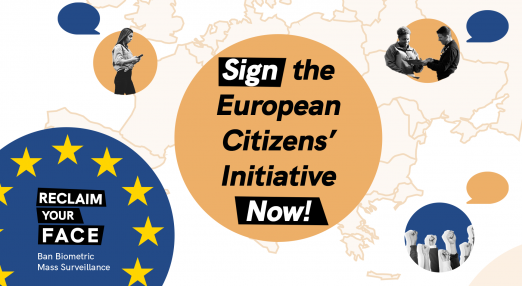
No faces left to hack: #ReclaimYourFace Now!
We cannot let power-hungry and profit-orientated technologies manipulate our future, take away our dignity and treat us like walking, breathing barcodes. We have the right to exercise our autonomy and self-determination free from abusive practices undermining our agency. The Reclaim Your Face’s ECI empowers Europeans to move and shape the public debate on the use of these AI-powered biometric technologies. The EU has the chance to show that people sit at the center of its values, by taking the lead to ban biometric mass surveillance that endangers our freedoms, democracies and futures.
Read more
-

The EU should regulate AI on the basis of rights, not risks
EDRi's member Access Now explains why the upcoming legislative proposal on AI should be a rights-based law, like the GDPR. The European Commission must not compromise our rights by substituting a mere risk mitigation exercise by the very actors with a vested interest in rolling out this technology.
Read more
-
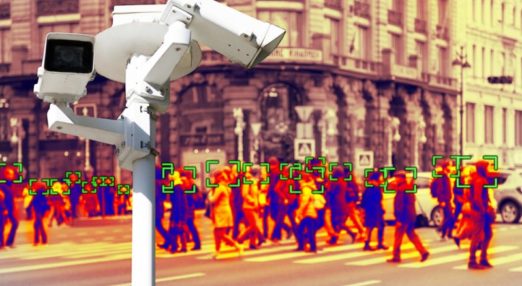
This is the EU’s chance to stop racism in artificial intelligence
Human rights mustn’t come second in the race to innovate, they should rather define innovations that better humanity. The European Commission's upcoming proposal may be the last opportunity to prevent harmful uses of AI-powered technologies, many of which are already marginalising Europe's racialised communities.
Read more
-
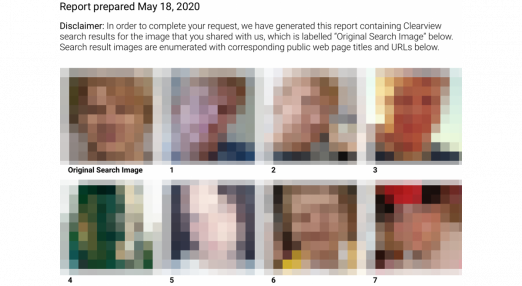
How to Reclaim Your Face From Clearview AI
The Hamburg Data Protection Authority deemed Clearview AI’s biometric photo database illegal in the EU as a result of a complaint Matthias Marx, a member of the Chaos Computer Club (an EDRi member) filed.
Read more
-
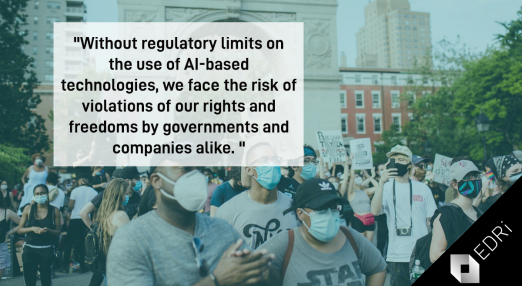
Civil society calls for AI red lines in the European Union’s Artificial Intelligence proposal
European Digital Rights together with 61 civil society organisations have sent an open letter to the European Commission demanding red lines for the applications of AI that threaten fundamental rights.
Read more
-
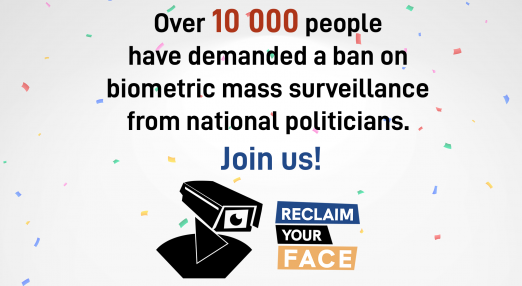
Reclaiming faces and public spaces!
The Reclaim Your Face movement is growing, and our demands for transparency, limiting the accepted uses and respect for humans are becoming more and more common across Europe. New organisations are joining the coalition each week, and people across Europe continue to sign the petition to add their voices to our demands. Now, thanks to campaigning by Homo Digitalis in Greece and Bits of Freedom in the Netherlands, we’re getting closer to real political and legislative changes that will protect our faces and our public spaces from biometric mass surveillance.
Read more
-

Looking back at digital rights in the era of a surveillance pandemic
2020 started as a year to build momentum to tackle various digital rights issues, including mass surveillance and freedom of expression online. Needless to say, the global pandemic disrupted not only these efforts but also our health, personal relations, basic survival needs and ways to organise around human rights. After 9 months of living and working in a pandemic, we look back at what we achieved and the ways forward from here.
Read more
-

For a truly “Trustworthy AI,” EU must protect rights and deliver benefits
EDRi member Access Now published a report exploring the actions EU governments are taking to promote what the EU calls Trustworthy AI, what this approach means for human rights, and how European AI strategy is changing, both for EU institutions and national governments.
Read more
-

Booklet: Technological testing grounds, border tech is experimenting with people’s lives
The European Union is increasingly experimenting with high risk migration management technologies.
Read more
